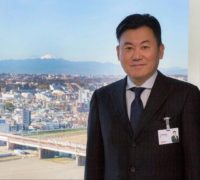The companies within the Rakuten Ecosystem have the name “Rakuten” in their title, and Mikitani is relentless in raising brand awareness through publicity and, in particular, sponsorship in sport: Rakuten is an official partner of seven-time NBA Champions Golden State Warriors, and for five years the company name was writ large on the shirts of top-flight soccer team FC Barcelona. “Building a brand is expensive,” says Mikitani. “Associating our brand with very special sports organizations is critical to getting our brands known.”
But he also says that sponsoring great teams sends a message that goes to the heart of two themes encapsulated in his leadership philosophy. The first speaks to one of the group’s five “brand concepts”: solidarity. “We function as a team,” Mikitani explains of the Rakuten Ecosystem. “Each player, each business, has a different character, different strengths, and different weaknesses – but we reinforce each other as one.”
A strong social purpose
The second theme is to contribute to society – a strong social purpose that echoes the beliefs of his father, who was quoted as saying that a corporation’s most important mission was to contribute to humanity. It is a philosophy Mikitani seems determined to continue. “We care about people, we care about community, we care about society,” he says. Rakuten has a strong philanthropic thrust, and the group has a strategic partnership with almost all of Japan’s prefectures.
But for Mikitani, contributing to society also involves speaking out on issues he believes are limiting Japan’s potential to compete on the international stage. “We have to change many, many things and become more capital friendly. Unfortunately, most business associations have large, vested interests and they fear change,” he says. “We prefer change. We know that we need more dynamic policy, which may sometimes be associated with pain. But without change, Japan risks becoming one of the world’s B-rated countries.” He adds: “I’m hoping that Japanese leaders will wake up some day.”
Mikitani’s relationship with Japanese business culture is complex. Workers, both Japanese and non-Japanese, are expected to embrace the group’s values and principles, or Rakuten Shugi. Every Monday, for example, every employee, including Mikitani himself, helps to tidy their office, including wiping down the legs of their chairs. “You have to be persistent,” says Mikitani. “You need to repeat and you need to create practices, which are very important for preserving the good parts of Japanese culture across the operations.”
He also draws heavily on the Japanese trait of personal commitment. “The most important thing to staying entrepreneurial is accountability,” he insists. “It’s not my business, it’s not shareholders’ business, it’s our business. If it were a house, you’d clean your living room, your kitchen, and if there were dust on your chair, you’d wipe it off, right? Why wouldn’t it be the same with your office?”
Yet one of the key leadership decisions he took about a decade ago was to establish English as Rakuten’s default language, both for its overseas operations and for Japan itself. It was a controversial move, but Mikitani says that it was a necessary step in his ambition to instil an international perspective. “I don’t want my staff to just have a domestic lens,” he explained. “I want them to look at what’s going on in the world, and to learn from best international practices.”
Mikitani also sees English as the gateway to recruiting the very best global talent. “We cannot only hire the best and brightest engineers and scientists from Japan when the US and China are producing far greater numbers,” he says. “Of course, we could try to ask non-Japanese people to study Japanese, but I don’t think that would work.”
One of his five so-called Principles for Success is “Speed!! Speed!! Speed!!” – an approach that he believes is essential in business whether you succeed or fail. “It’s a matter not only of how you succeed fast, but also how you fail fast,” he said. “Failure, for me, is a learning experience. We learn something, we fix the business, or sometimes we retreat, but we learn something and we become stronger.”
How does he see Rakuten’s future, particularly given the apparent contrast between the group’s hitherto asset-light structure and the more-recent heavy investments generated by its decision to roll out its own mobile network?
Mikitani draws analogies with Amazon as a justification. “Asset-light is attractive, but at the same time it’s dangerous,” he said. “If you think about why Amazon is so strong, it’s because of their Amazon Web Services (AWS) infrastructure and their logistics capabilities. In some countries, it’s very difficult to compete with Amazon because they have invested so much. So has Google – their data centers are super capital-intensive.”
He also says that data generated by the Rakuten Ecosystem will play a pivotal role in the group’s success. “It’s not just search data,” he said. “We know people’s transactions. We have to be conscious about privacy, but at the same time we can leverage that data and expand.”
Is that a challenge he relishes or is all the drive and vision taking a toll? “I do like challenges,” he admitted. But he also pauses for thought. “Do I love my job? I don’t know… it’s more a sense of responsibility and duty. It’s something I have to do.”
YouTube

 Podcast available
Podcast available


 Podcast available
Podcast available